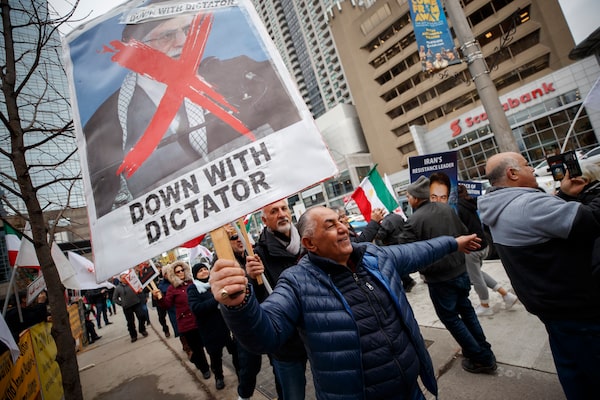
A few dozen Iranian-Canadians gather in Toronto on Friday to celebrate the death of a top Iranian general in Iraq in Toronto, Friday, Jan. 3, 2020.Cole Burston/The Canadian Press
Canada has not talked to Iran about re-establishing formal diplomatic relations in more than two years, after a high-profile consular case put talks on ice and the recent downing of Flight 752 killed dozens of Canadians.
Canada last discussed the prospect of restoring relations with Iran when officials visited Tehran in October, 2017, but the countries have not talked about the matter since then, according to a senior government official. The Globe and Mail is not identifying them because they were not authorized to speak publicly on the issue. The Liberals pledged during the 2015 federal election campaign to re-establish diplomatic ties with Iran, after the then-Conservative government expelled Iranian diplomats from Canada and closed the Canadian embassy in Tehran in 2012.
However, re-engagement talks were put on hold in February, 2018, when Canadian-Iranian professor Kavous Seyed-Emami died mysteriously in Tehran’s secretive Evin prison and Iran barred his widow, Maryam Mombeini, from returning to Canada for 582 days.
During Ms. Mombeini’s ordeal, then-foreign affairs minister Chrystia Freeland said full diplomatic talks with Iran would not occur until the dual Canadian-Iranian citizen was allowed to return home. Ms. Mombeini returned to Canada last October after a harrowing escape from Iran, but the governments have not resumed re-engagement talks since.
The prospect of Iran and Canada returning to the discussion table ground to a standstill in January when the Iranian military shot down Ukraine International Airlines Flight 752 outside Tehran. The disaster killed all 176 people on board, including 57 Canadian citizens and 29 permanent residents of Canada.
Foreign Affairs Minister François-Philippe Champagne’s office said Canada’s talks with Iran are currently centered on the crash investigation, including securing compensation for the victims’ families. Mr. Champagne has spoken to his Iranian counterpart, Javad Zarif, three times since the crash, urging Iran to hand over the flight recorders to France, which has the expertise to do the analysis.
“When it comes to relations with Iran, our focus remains squarely on ensuring closure, transparency, accountability and justice for the Canadian victims of the Flight PS752 tragedy,” said Syrine Khoury, Mr. Champagne’s press secretary, in a statement.
Discussions about restoring full diplomatic relations between Canada and Iran, including the reopening of embassies in one another’s capitals, have deeply divided the Canadian-Iranian community.
Payam Akhavan, a Tehran-born professor of international law at McGill University, said it would be difficult for Canada to prioritize justice for the victims of the Flight 752 crash while seeking to re-establish diplomatic relations with Iran.
“It would seem as if we are rewarding Iran for shooting down PS752, so I think the question of diplomatic re-engagement is a matter for another day," he said.
Prof. Akhavan said Canadians have good reason to be skeptical of the Iranian government’s willingness to engage in good-faith talks, saying “we’re dealing with an authoritarian government with an appalling human-rights record.”
Younes Zangiabadi is an Iranian-Canadian and co-founder of The Institute for Peace and Diplomacy, a self-described progressive foreign-policy think tank. He said Canada should demand accountability from Iran with the long-term goal of re-engaging.
“The offer should be given to Iran that Canada is willing to re-establish diplomatic relations, but the plane tragedy is a pressing issue for Canada. If Iran wants to move forward with Canada – wants to engage more – it needs to build trust," Mr. Zangiabadi said.
In 2018, Parliament voted in favour of a Conservative motion calling on the government to “abandon its current plan and immediately cease any and all negotiations or discussions" to restore relations with Iran. Prime Minister Justin Trudeau led a majority of Liberals MPs who voted in favour of the motion, which also called on the government to list Iran’s Islamic Revolutionary Guard Corps (IRGC) as a terrorist group.
More than a year and a half later, the government still hasn’t listed the IRGC. Speaking to The Globe last month, Liberal MP Majid Jowhari, an Iranian-Canadian, said it is now up to cabinet to designate the IRGC as a terrorist entity – something he says he would support.
Public Safety Minister Bill Blair’s office said the listing of terrorist entities is an “ongoing process,” but declined to say if Canada would designate the IRGC. Spokeswoman Mary-Liz Power noted that the IRGC’s Quds Force – the branch that engages in military intelligence – is already listed as a terrorist group and Canada continues to impose sanctions on the IRGC.